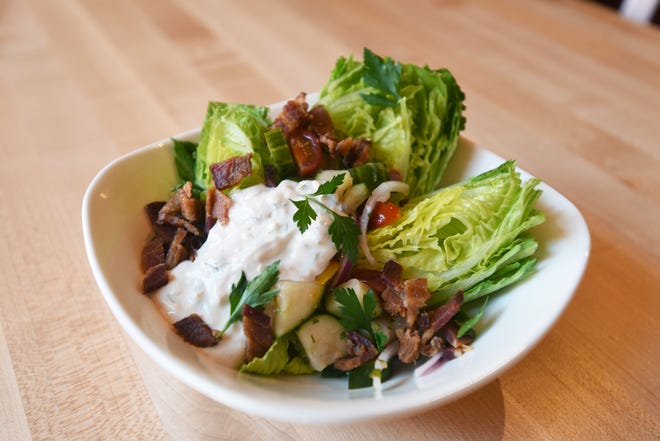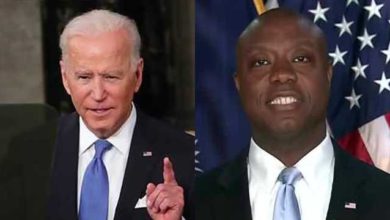With somber words and music set against a backdrop of images of New Yorkers taken by the coronavirus pandemic, New York City on Sunday marked a year since they learned of the state's first fatalities from COVID-19, a fearful moment of reckoning that sent officials rushing to close businesses and schools.
Mayor Bill de Blasio called the total number of lives lost in the city “a number we can barely imagine,” noting it represented more than the city lost in World War II, Vietnam, Sept. 11 and Superstorm Sandy combined.
As devastating as the losses have been, he added: "Everyone we've lost, what they did, goes on. What they contributed, what they created, the love they gave, goes on.”
But the state is showing signs of renewal. Gov. Andrew Cuomo announced Friday that domestic travelers to New York will no longer be required to quarantine starting April 1.
It's something mirrored in the rest of the country— with vaccinations accelerating and COVID-19 case rates dropping, more than 90% of California's population of nearly 40 million residents could be out of the most restrictive color-coded tier by Wednesday.
But Dr. Anthony Fauci warned on Fox News Sunday that the U.S. must gradually lift restrictions or risk another wide-ranging lockdown to halt a surge.
Meanwhile, Florida’s beaches and bars are already seeing the first throngs of college students on break, crowding beaches and bars — and worrying public health experts around the country who see the weeks of partying as a potential for another spike in coronavirus cases.
Also in the news:
►Federal data last week showed Connecticut lagging the national average on fully completed COVID-19 vaccinations. But federal and state officials now say those numbers were reported in error, and that about 70,000 shots were logged incorrectly in the state.
►Fauci told CNN's "State of the Union" on Sunday that federal restrictions "will be much more liberal" and the U.S. could see a "considerable degree of normality" by the Fourth of July if U.S. cases drop as more Americans are vaccinated.
►A recent new PBS NewsHour/NPR/Marist poll found 41% of Republicans saying they would not get one of the three federally approved coronavirus vaccines, compared with less than 15% of Democrats.
►Newly vaccinated Massachusetts residents were treated to a mini-concert Saturday when famed cellist Yo-Yo Ma brought out his instrument after getting his second shot.
►Lower physical distancing policies, with masking, can be implemented in schools without negatively impacting student or staff safety, a new study said last week.
? Today's numbers: The U.S. has over 29.4 million confirmed coronavirus cases and more than 534,800 deaths, according to Johns Hopkins University data. The global totals: Almost 120 million cases and 2.65 million deaths. More than 135.8 million vaccine doses have been distributed in the U.S. and 107 million have been administered, according to the CDC.
? What we're reading: Treatment for the sickest patients has improved since the World Health Organization declared COVID-19 a global pandemic a year ago, but about 20% of patients sick enough to be hospitalized still end up in intensive care. That figure that hasn't changed in the last year.
USA TODAY is tracking COVID-19 news. Keep refreshing this page for the latest updates. Want more? Sign up for our Coronavirus Watch newsletter for updates to your inbox and join our Facebook group.
With nearly 12M shots given, California opens vaccine eligibility
On Monday, California will open up vaccine eligibility to people with certain significant, high-risk medical conditions or disabilities. An estimated 4.4 million Californians meet the state criteria, which includes more essential workers, people who work or live in jails, homeless shelters and other congregant places, and those with disabilities and health conditions that put them at risk of severe COVID-19.
San Francisco will allow people with HIV to get vaccinated, along with people who identify as deaf or disabled, local officials said. The city is going beyond the state's eligibility rules to cover developmental, medical, physical, sensory or behavioral health disabilities, including severe mental health or substance use disorders, the San Francisco Chronicle reported Sunday.
"Getting vaccinations to people with disabilities and who have severe underlying conditions, and people who are in congregate settings, is an important part of our efforts to save lives and protect our most vulnerable residents,” Mayor London Breed said in a statement.
Eligible people will not be required to provide documentation but will be asked to sign a self-attestation that they meet the criteria, the state’s public health department said.
As of late Sunday, providers have reported administering a total of 11,785,750 vaccine doses statewide.
- Desert Sun
Duke University locks down students; fate of semester 'hangs in the balance'
Duke undergraduate students have been ordered to stay-in-place until 9 a.m. next Sunday as the school struggles to contain a virus outbreak "principally driven by students attending recruitment parties for selective living groups," the school said in a letter to students. More than 180 students have been placed in isolation after testing positive in the last week; an additional 200 students are being quarantined as a result of contact tracing.
Students living in Duke-provided housing must remain in their residence hall room or apartment "at all times except for essential activities related to food, health or safety," the letter said. Students living off-campus are not permitted on campus.
"If this feels serious, it’s because it is," the letter said. "Our ability to complete the semester, commencement for our seniors, and the health and safety of our community, including your fellow undergraduate students, is hanging in the balance."
Patients with sickle cell find freedom with vaccine
As the mother of two children, ages 10 and 11, with sickle cell disease, Mariame Doray has spent the past year being extra careful, knowing that they would be at increased risk of severe disease if they fell ill with COVID-19.
So when she heard that Indianapolis's Martin Center, a service agency that supports people with sickle cell disease, was offering a Saturday vaccination clinic for their patients and their family members in concert with Community Health Network, she signed up.
“Now I feel better going to work,” she said, gesturing to the sticker on her shirt that attested to her newly acquired vaccination status.
Sickle cell disease is a genetic blood disorder that can lead to a host of symptoms, including heart problems, stroke, organ damage, reduced life expectancy, and episodes of pain. About 95% of people diagnosed with these conditions are Black.
Sickle cell disease patients were added to the Indiana vaccine availability lists in February, along with people with some other high-risk conditions.
Because people who have sickle cell have double the risk of dying from COVID-19, many with the disease have had to be extra careful for the past year.
“Anything that can challenge their immune system definitely can put them in crisis mode,” said Dawn Moore, Community Health Network vice president and chief pharmacy officer. “The goal is to get vaccines into arms.” Read more here.
- Shari Rudavsky, Indianapolis Star
Here's how to find out when your stimulus payment will come
You can now find out when your next stimulus payment is expected to hit your bank account or get mailed. The IRS updated the "Get My Payment" tool on its website with information on the third round of stimulus checks Saturday, agency spokesperson Karen Connelly confirmed to USA TODAY. Check for your status here.
The third round of Economic Impact Payments will be based on a taxpayer’s latest processed tax return from either 2020 or 2019. That includes anyone who used the IRS non-filers tool last year or submitted a special simplified tax return.
– Kelly Tyko
Contributing: The Associated Press
Source link







